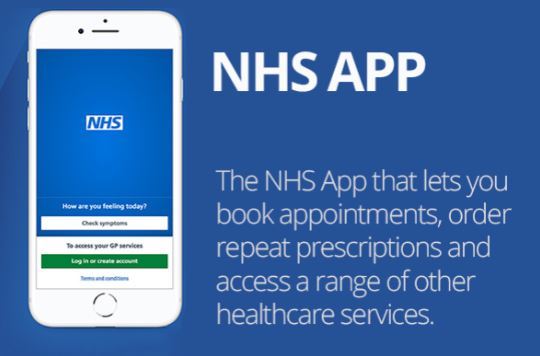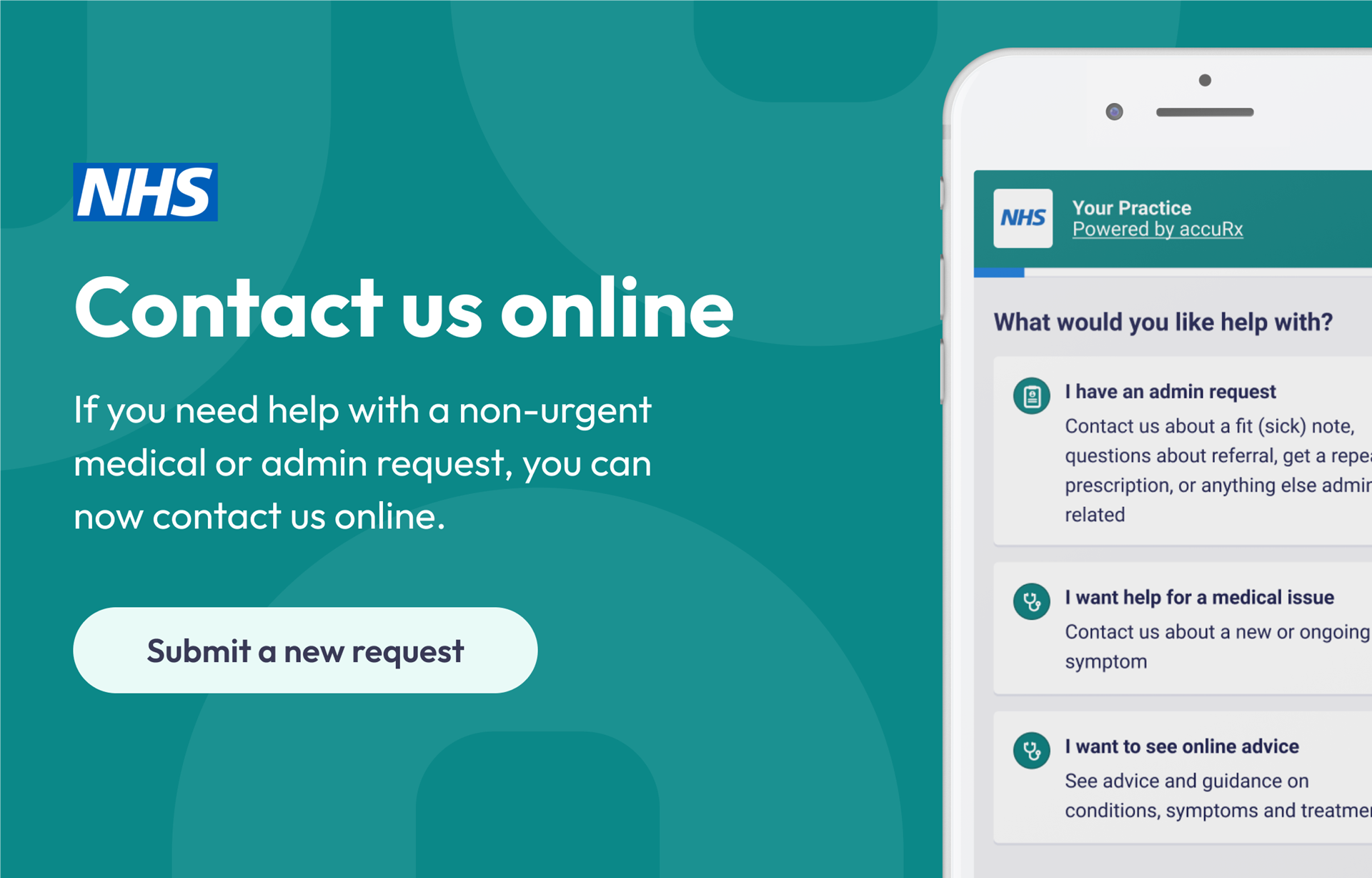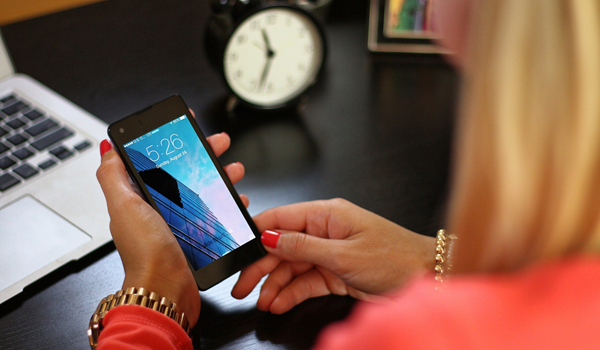Urgent Appointment
To request an urgent appointment for today or tomorrow (Monday to Friday):
- use our appointment request form, Monday to Friday from 9am to 5pm. We will respond within 24 hours during opening times
- phone us on 020 8693 2912, Monday to Friday from 9am to 5pm
- visit the surgery and speak with a receptionist, Monday to Friday from 9am to 5pm
When you get in touch, we’ll ask what you need help with.
We will use the information you give us to choose the most suitable doctor, nurse or health professional to help you.
Routine Appointment
To request a routine appointment in the next 7 days:
- use our appointment request form, Monday to Friday 9am to 5pm. We will respond within 24 hours during opening times
- phone us on 01234 567 890, Monday to Friday from 9am to 5pm
- visit the surgery and speak with a receptionist, Monday to Friday from 9am to 5pm
- use your NHS account (through the NHS website or NHS App) to book a screening test or vaccination
When you get in touch, we’ll ask what you need help with.
We will use the information you give us to choose the most suitable doctor, nurse or health professional to help you.
Your appointment
However you choose to contact us, we may offer you a consultation:
- by phone
- face to face at the surgery
- on a video call
- by text or email
Appointments by phone, video call or by text or email can be more flexible and often means you get help sooner.
Cancelling or changing an appointment
To cancel your appointment:
- use your NHS account (through the NHS website or NHS App)
- using the GP online system – [Insert name of practice system tool]
- phone us on 01234 567 890, Monday to Friday from 9am to 5pm
- reply CANCEL to your appointment reminder text message
If you need help when we are closed
If you need medical help now, use NHS 111 online or Call 111.
NHS 111 online is for people aged 5 and over. Call 111 if you need help for a child under 5.
Call 999 in a medical or mental health emergency. This is when someone is seriously ill or injured and their life is at risk.
If you need help with your appointment
Please tell us:
- if there’s a specific doctor, nurse or other health professional you would prefer to respond
- if you would prefer to consult with the doctor or nurse by phone, face-to-face, by video call or by text or email
- if you need an interpreter
- if you have any other access or communication needs
Home visits
If you are housebound and need an appointment, we will do a home visit. We will phone you first to understand what you need.
To request a home visit, it’s helpful if you phone the practice as soon after 8am as possible.
Appointments System
The practice has an appointments system in place. Please telephone the receptionist during surgery hours to book a routine appointment with the available doctor on duty.
For emergency appointments we ask that you contact the practice during the time 8:00-8:45am Monday through Friday.
Our practice is a part of IHL (Improving Health Limited) and are able to offer you extended hours appointments at the Lister Clinic.
Telephone Consultations
If you are unable to attend the surgery and need medical advice, please contact the surgery to schedule a telephone consultation with a doctor. We maintain patient confidentiality at all times. So please note we would not give information about you to someone else without your written consent.
Interpreter
Please note that if you require an interpreter for your consultation there may be two weeks waiting list to see the doctor. Please make your needs clear to the receptionist so that they can arrange it for you.
Home Visits
Whilst we encourage our patients to come to the surgery, where we have the proper equipment and facilities available, we do appreciate this is not always possible. In this respect, if you do need a home visit, you can help us by calling reception between 09:00 and 10:00.
You may only request a home visit if you are housebound or are too ill to visit the practice. Your GP will only visit you at home if they think that your medical condition requires it and will also decide how urgently a visit is needed. Please bear this in mind and be prepared to provide suitable details to enable the doctor to schedule house calls
You can also be visited at home by a community nurse if you are referred by your GP. You should also be visited at home by a health visitor if you have recently had a baby or if you are newly registered with a GP and have a child under five years.
Accessing someone else's information
Some patients find it helpful for a second person to have access to their online GP record. This is often a parent, family member, next of kin, close friend, carer or someone they trust to act on their behalf. This is called having proxy access. If you’re aged 16 or over, you can ask for someone to be your proxy for any reason. It does not stop you having access to your GP services yourself.
To requests proxy access:
- Collect a proxy access consent form from reception from 10am to 6pm
- Complete our online consent form and bring it to the practice
- Hand the in the consent form to reception. Both patient and proxy will need to provide two forms of Identification, one should contain photographic ID such as a valid passport, driving licence or older persons bus pass. Access Guidelines and full list of acceptable documents below. If you do not have forms of ID there are other ways to prove your identity. Please ask at reception.
If the patient does not have access to online services you will need to set this up first before being granted proxy access. You can also do this at the practice or by creating a NHS login.
A patient may choose to have more than one proxy, and each can have a different level of access.
Proxy Access
Giving another person access to your GP online services
Did you know that you can choose to give another person access to your GP online services on your behalf?
You don’t need to know how to use these services or have a computer yourself to give another person access.
Who can have access?
You choose who you want to give access to. This could be your carer, partner, parent or another family member. You can also give access to more than one person. Giving access to another person is your choice. No-one can go to your GP surgery and ask for access to your online services without your permission.
You also choose which online services you want each person to use. These are booking appointments, ordering repeat prescriptions and looking at your GP record. You decide whether to let them use one, two or all of the services on your behalf.
Why you may want to give another person access
- You are very unwell or just need help managing your health
- You have a long term condition ,for example diabetes, heart disease, asthma or high blood pressure and would like support with checking test results, ordering repeat prescriptions and understanding your treatment
- You are finding it more difficult to look after yourself, for example due to memory issues or speech difficulties
- You have learning difficulties and want someone else to help you understand your health
- You have a carer who can help you manage your health
- You may be planning for the future or choosing someone to hold lasting power of attorney for health and social care for you
- You are a young person and would like your parent or guardian to look after your health.
- You work away from home or are just busy and need help with booking appointments or ordering repeat prescriptions.
- You are not comfortable with using computers, smart phones, or tablets
You may wish to allow another person to use your online services for different reasons. For example:
For more information on GP online services for carers, see our leaflets ‘GP online services for carers including young carers’ and ‘Giving employed carers access to your GP online services’. These can be found at Getting started with GP online services.
Benefits
Before giving another person access, you should think about what the benefits will be for you. If you cannot think of any, then you should think very carefully whether allowing them access is the right thing to do. Some of the benefits are:
- You have peace of mind that someone is supporting you with managing your health
- The person you choose can help you make sure the information your surgery has about you is correct, for example your medication and allergies.
- You know that someone else understands your medical information and can provide information when you are unable to. This could be when you are unconscious or too unwell to speak or when you need help explaining or understanding something
- You can benefit from the convenience of using GP online services even if you do not use a computer or do not have access to the internet
- One member of the family can book appointments for everyone in the household and make sure the appointments fit with your family activities
If you have a carer, using GP online services can save them time allowing them to spend more time looking after your needs.
How it works
The recommended and safest way to give another person access to your online services is for them to have their own username and password. If you use online services yourself, you should not share your username and password with anyone.
If you share your username and password, your surgery cannot tell whether you or someone else accessed your online services. This may be a problem if someone else misuses your login details and your surgery has to look into this.
How to sign up
The steps below show how you can give another person access:
- Contact your surgery to let them know you would like to give your chosen person access to your GP online services. You will need to register for online services for yourself first if you do not have access.
- The Practice will give your chosen person a short form to fill in (see proxy access consent form download below). You will also need to sign to confirm you agree with the information on the form. You can also choose what services you would like your chosen person to have access to. It is up to you.
- Your chosen person will need to show your surgery their photo ID and proof of address, for example, a passport or photo driving licence and a bank statement or council tax statement. If they don’t have the required ID, speak to staff at the surgery, who may be able to help confirm their identity in another way.
- Staff at the Practice will make a decision on whether to give your chosen person access to your GP online services. If we decide not to give them access, we will discuss their reasons with you
- The staff will give your chosen person their own username and password to use to login to your GP online services.
Things to consider before giving another person access
- Is there any information in your records you would not like anyone to see or know about?
- Can you trust the person to keep your information safe and not share it with others or use it without your permission?
- Is any one forcing you into sharing your online services with them or do you think someone could force you to share it with them? If so, we would advise that you do not give them access. If you have any concerns that someone has access to your online records without your permission, speak to your surgery and they can change your password or stop your online services
- How long would you like your chosen person to have access for? This can be for a short time, for example when you are suffering from a certain illness and you need support with managing your health during that time. It can also be ongoing so they can help you for a long period of time. You can discuss this with the Practice.
Lasting power of attorney for health and welfare or court appointed deputy
When a person is unable to make decisions for themselves, another person, usually a partner or close family member can be given legal responsibility over decisions concerning their life by the courts. This is called Health and Welfare Lasting Power of Attorney. A person with lasting power of attorney can ask the patient’s surgery for access to their online services. The GP will make a decision whether this should be allowed.
If you know that you would never want a particular person to have access to your online services if you become unable to make your own decisions, you should tell your GP and they will never share them with that person.
Why your surgery may refuse to give your chosen person access
On rare occasions, your GP could refuse to allow your chosen person to use GP online services on your behalf. If this happens, your GP will discuss their reasons with you. Some of the reasons your GP could have are:
- Your GP does not think it is in your best interest for your chosen person to use these services on your behalf
- You or your chosen people have misused online services in the past
- The Practice is concerned that your chosen person will not keep your information safe
- The Practice suspects someone is forcing you to give them permission to use your online services
- You are not able to make decisions for yourself.
Why your surgery can stop the service
- We believe your chosen person is forcing you to share your GP records with them or with another person.
- Your chosen person has misused your GP information
- You are no longer able to understand or remember that you gave your chosen person permission to use online services on your behalf
- You have told the Practice in the past that if you become unable to make decisions for yourself, you do not wish for your chosen person or anyone to have permission to your online services
- You have died.
How you can stop the service
You can choose to take away access to your GP online services from your chosen person at any time.To end the service, you need to let your surgery know you would like them to switch off online access for your chosen person and give them the reason.Your surgery will then stop the service and your chosen person will not be able to use their login details to look at your information.
Why you may want to stop access
Some of the reasons you can choose to end the service are:
- You only needed your chosen person to support you for a short time, for example when you were suffering from a certain illness and you needed help with managing your health during that time
- You want to give this responsibility to another person, for example, if you have a new carer or personal assistant
- Your relationship with your chosen person has broken down
- Your chosen person has misused information in your GP records, for example, they have collected medication in your name or they have shared your private information with someone without your permission.
Not Registered for Online Services?
Cancel an Appointment
It is important that you inform the reception staff if you are unable to attend your appointment, this will allow that appointment to be offered to another patient. If you fail to notify the Practice that you are unable to attend, you will be sent a letter informing you that you have defaulted from your appointment. Persistent defaulters maybe removed from the list.
You can also complete our appointment cancellation notification request form. This can only be used if your appointment has been arranged for more than 24 hours in advance. (excluding weekends and public holidays). You can also text to cancel your appointment.
Text Reminder Service
We have a texting service which allows you to receive confirmation and reminders about your appointments.
To have this service you will need to register by completing a consent form.
Please remember to update your contact details with us when you change address, telephone numbers and email address.







